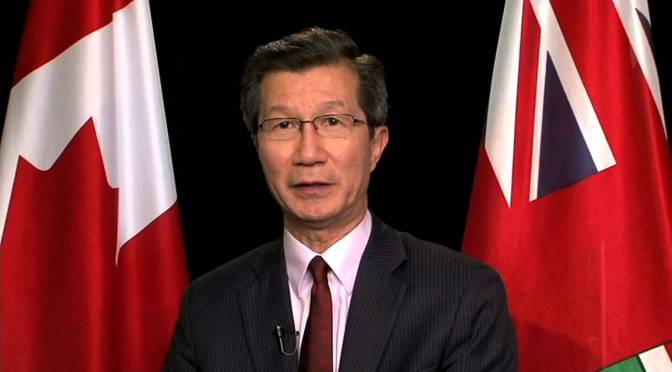Further to these posts,
If Feds Bail Out Bombardier, Can Ontario Auto Sector be Far Behind?
[Nov. 2015, company wants US$ 1B]Things Looking Pretty Grim for Ontario Auto Sector–Fed Money (and provincial)?
[Aug. 2016]
and this news story September 13,
Quebec minister urges Ottawa to make a decision on Bombardier
Canadian government officials should “make up their minds” on a financial aid request by struggling aircraft maker Bombardier Inc., Quebec Finance Minister Carlos Leitao says.
Quebec announced an aid package for the C Series program late last year [also US$ 1B], which helped stabilize the Montreal-based company and allowed it to secure sales for the jet [see “Bombardier Loss-Leads CSeries to Delta–Big Time (plus Canadian politics)“], Mr. Leitao said at the Bloomberg Canadian Fixed Income Conference in New York. Quebec finalized the deal in June…
…Mr. Leitao says federal funding would allow the company to start developing new products…
it seems very likely to me that the real reason for Ottawa’s dithering is that the government knows it will have to pony up a lot of cash–along with the province–for the auto manufacturers in Ontario, especially to keep General Motors operating in Oshawa. If it had already given Bombardier its one billion then it would have severely weakened its bargaining position in trying to minimize the goodies for the car companies–money that will almost certainly be needed to avoid big job losses and money that will almost certainly be forthcoming.
The latest:
1) Oshawa’s future at play in talks with General Motors: Unifor has threatened to strike at midnight next Monday [Sept. 19] unless it wins a commitment from the company for more future work in Oshawa.
For auto workers in Oshawa, it’s do-or-die time.
In a city that was once synonymous with General Motors, there’s no promise of any future auto assembly work beyond 2019, so there are real fears production could shut down altogether.
That’s why Unifor, formerly the Canadian Auto Workers union, has threatened to strike at midnight next Monday, unless it wins a commitment from the company for more future work in Oshawa.
“If we don’t nail it now, we’re not going to nail it done, ever,” said Jerry Dias, the union’s national president. “If they are planning on closing Oshawa, then we’re going to have a strike.”
GM officials have long insisted that it won’t talk about new products in Canada until a collective agreement is signed first.
That’s why the union picked General Motors over Ford or Fiat Chrysler as its target to negotiate a contract that will hopefully set a pattern for the other two automakers…
John Holmes, an emeritus professor of geography at Queen’s University, said the union’s strategy to make GM its target is to win government support.
“I do think this is a very important round of negotiations for Canada – there is a lot at stake – including GM’s future in Canada,” he said.
“But I wonder the degree to which the union is making commitments of new products such a central issue . . . whether this is part of the union’s strategy trying to get jobs on the political agenda for the provincial government and the federal government,” said Holmes, who studies the North American auto industry.
Dias acknowledges that the stars appear to be aligning now, given that both Premier Kathleen Wynne and Prime Minister Justin Trudeau understand the importance of auto manufacturing to the Canadian economy [emphasis added, i.e. they better pay up].
“They get it. They are not foolish,” he said, adding that the Stephen Harper government was resistant to investment. “This whole thing about taxpayers’ money going for profitable companies . . . I understand the argument.
“But these companies have options. So we can be puritans, and be holier than thou and not have any jobs. Then we would be fools. There would be no tax base,” Dias said, noting other jurisdictions including Mexico are wooing car companies [more below]…
2) Ottawa changes auto fund to issue grants instead of loans
The federal government has quietly signalled to the auto industry that it is changing one of the key terms of the Automotive Innovation Fund (AIF), which offers financial assistance to vehicle manufacturers and parts makers to invest in existing Canadian plants or open new facilities [website here].
The federal program, introduced in 2008 by the Conservative government of Stephen Harper, offers repayable loans – treated by Canada Revenue Agency as revenue and thus partly subject to tax – to auto makers and parts companies. The Ontario government and many other jurisdictions seeking to land auto investment offer tax-free grants.
Ottawa will change the program so that it offers grants instead of loans, multiple industry sources said.
Auto makers began lobbying for a change in the program almost immediately after it was introduced, pointing out it was one of a series of factors that made Canada uncompetitive in the battle against Mexico and the U.S. South for new investments…
The move by the federal government comes amid negotiations between General Motors Co. and Unifor, the union that represents the company’s hourly paid workers in Canada, that centre on the future of an assembly plant and about 2,400 jobs in Oshawa, Ont.
General Motors of Canada Co. president Stephen Carlisle has said the federal program should offer grants instead of loans and it is one factor among several – including the outcome of bargaining with Unifor – that will determine whether Oshawa will be competitive enough to win new investment [emphasis added, the writing on the factory wall is pretty darn clear, ain’t it?].
By the way Unifor also represents Bombardier’s aviation workers at Downsview, Ontario, where the Q400 turboprop airliner and Global bizjets have final assembly (more here)–and both those programs are having their respective problems, see here and here. So the union would sure love that federal moolah for both the aviation and auto industries.
Poor taxpayers, federal and provincial. Happy corporate welfare bums.
Mark Collins, a prolific Ottawa blogger, is a Fellow at the Canadian Global Affairs Institute; he tweets @Mark3Ds






